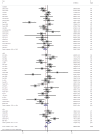The roles of variants in human multidrug resistance (MDR1) gene and their haplotypes on antiepileptic drugs response: a meta-analysis of 57 studies
- PMID: 25816099
- PMCID: PMC4376792
- DOI: 10.1371/journal.pone.0122043
The roles of variants in human multidrug resistance (MDR1) gene and their haplotypes on antiepileptic drugs response: a meta-analysis of 57 studies
Abstract
Objective: Previous studies reported the associations between the ATP-binding cassette sub-family B member 1 (ABCB1, also known as MDR1) polymorphisms and their haplotypes with risk of response to antiepileptic drugs in epilepsy, however, the results were inconclusive.
Methods: The Pubmed, Embase, Web of Science, CNKI and Chinese Biomedicine databases were searched up to July 15, 2014. Pooled odds ratios (ORs) and 95% confidence intervals (CIs) were calculated using a fixed-effects or random-effects model based on heterogeneity tests. Meta-regression and Galbraith plot analysis were carried out to explore the possible heterogeneity.
Results: A total of 57 studies involving 12407 patients (6083 drug-resistant and 6324 drug-responsive patients with epilepsy) were included in the pooled-analysis. For all three polymorphisms (C3435T, G2677T/A, and C1236T), we observed a wide spectrum of minor allele frequencies across different ethnicities. A significantly decreased risk of AEDs resistance was observed in Caucasian patients with T allele of C3435T variant, which was still significant after adjusted by multiple testing corrections (T vs C: OR=0.83, 95%CI=0.71-0.96, p=0.01). However, no significant association was observed between the other two variants and AEDs resistance. Of their haplotypes in ABCB1 gene (all studies were in Indians and Asians), no significant association was observed with AEDs resistance. Moreover, sensitivity and Cumulative analysis showed that the results of this meta-analysis were stable.
Conclusion: In summary, this meta-analysis demonstrated that effect of C3435T variant on risk of AEDs resistance was ethnicity-dependent, which was significant in Caucasians. Additionally, further studies in different ethnic groups are warranted to clarify possible roles of haplotypes in ABCB1 gene in AEDs resistance, especially in Caucasians.
Conflict of interest statement
Figures



Similar articles
-
The ABCB1-C3435T polymorphism likely acts as a risk factor for resistance to antiepileptic drugs.Epilepsy Res. 2014 Aug;108(6):1052-67. doi: 10.1016/j.eplepsyres.2014.03.019. Epub 2014 Apr 8. Epilepsy Res. 2014. PMID: 24794827
-
Association between G2677T/A polymorphism in ABCB1 gene and the risk of drug resistance epilepsy: An updated systematic review and meta-analysis.Epilepsy Res. 2022 Sep;185:106977. doi: 10.1016/j.eplepsyres.2022.106977. Epub 2022 Jul 8. Epilepsy Res. 2022. PMID: 35853334
-
ABCB1 Polymorphisms and Drug-Resistant Epilepsy in a Tunisian Population.Dis Markers. 2019 Dec 2;2019:1343650. doi: 10.1155/2019/1343650. eCollection 2019. Dis Markers. 2019. PMID: 31871496 Free PMC article.
-
The drug-transporter gene MDR1 C3435T and G2677T/A polymorphisms and the risk of multidrug-resistant epilepsy in Turkish children.Mol Biol Rep. 2014 Jan;41(1):331-6. doi: 10.1007/s11033-013-2866-y. Epub 2013 Nov 10. Mol Biol Rep. 2014. PMID: 24213830 Free PMC article.
-
The ABCC2 c.-24C>T polymorphism increases the risk of resistance to antiepileptic drugs: A meta-analysis.J Clin Neurosci. 2017 Mar;37:6-14. doi: 10.1016/j.jocn.2016.10.014. Epub 2016 Nov 2. J Clin Neurosci. 2017. PMID: 27816260 Review.
Cited by
-
Impact of ABCB1 Polymorphisms on Lacosamide Serum Concentrations in Uygur Pediatric Patients With Epilepsy in China.Ther Drug Monit. 2022 Jun 1;44(3):455-464. doi: 10.1097/FTD.0000000000000927. Epub 2021 Oct 5. Ther Drug Monit. 2022. PMID: 34610620 Free PMC article.
-
Polymorphisms in the Drug Transporter Gene ABCB1 Are Associated with Drug Response in Saudi Epileptic Pediatric Patients.Biomedicines. 2023 Sep 11;11(9):2505. doi: 10.3390/biomedicines11092505. Biomedicines. 2023. PMID: 37760947 Free PMC article.
-
ABCB1 Polymorphism Is Associated with Higher Carbamazepine Clearance in Children.Pediatr Rep. 2025 Jan 16;17(1):10. doi: 10.3390/pediatric17010010. Pediatr Rep. 2025. PMID: 39846525 Free PMC article.
-
Impact of Genetic Polymorphisms on Phenytoin Pharmacokinetics and Clinical Outcomes in the Middle East and North Africa Region.Drugs R D. 2017 Sep;17(3):341-361. doi: 10.1007/s40268-017-0195-7. Drugs R D. 2017. PMID: 28748348 Free PMC article.
-
Population pharmacokinetics of oxcarbazepine 10-monohydroxy derivative in Chinese adult epileptic patients.Eur J Hosp Pharm. 2023 Mar;30(e1):e90-e96. doi: 10.1136/ejhpharm-2022-003357. Epub 2022 Jul 4. Eur J Hosp Pharm. 2023. PMID: 35787526 Free PMC article.
References
-
- Duncan JS, Sander JW, Sisodiya SM, Walker MC. Adult epilepsy. Lancet. 2006;367:1087–100. - PubMed
-
- Brodie MJ, Shorvon SD, Canger R, Halasz P, Johannessen S, Thompson P, et al. Commission on European Affairs: appropriate standards of epilepsy care across Europe.ILEA. Epilepsia. 1997;38:1245–50. - PubMed
-
- Kwan P, Brodie MJ. Early identification of refractory epilepsy. The New England journal of medicine. 2000;342:314–9. - PubMed
-
- Brodie MJ, Dichter MA. Antiepileptic drugs. The New England journal of medicine. 1996;334:168–75. - PubMed
-
- Sander JW. Some aspects of prognosis in the epilepsies: a review. Epilepsia. 1993;34:1007–16. - PubMed
Publication types
MeSH terms
Substances
LinkOut - more resources
Full Text Sources
Other Literature Sources
Medical

